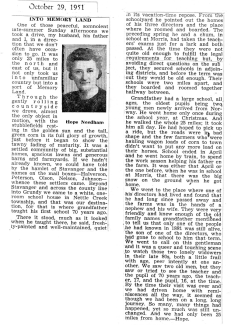One of those peaceful, somnolent late-summer Sunday afternoons we took a drive, my husband, his father and I, in a direction that we don't often have occasion to go. It was only 25 miles to the north and east of us, but it not only took us into unfamiliar country but into a sort of Memory Land.
Through the gently rolling countryside we drove, almost the only object in motion, with the stubblefields resting in the golden sun and the tall, green corn in its full glory of growth, just before it began to show the tawny fading of maturity. It was a settled community of big, substantial homes, spacious lawns and generous barns and farmyards. If we hadn't already known, we could have told by the hamlet of Stavanger and the names on the mail boxes -- Halverson, Peterson, Olson, Nelson, Johnson -- whence these settlers came. Beyond Stavanger and across the county line into Grundy we came to a white, one-room school house in Nettle Creek township, and that was our destination, for that is where grandfather taught his first school 70 years. ago.
There it stood, much as it looked when he taught there, he said, freshly painted and well-maintained, quiet in its vacation-time repose. From the schoolyard he pointed out the homes of his three directors and the place where he roomed and boarded. The preceding spring he and a chum, in school at Morris, had taken the teachers' exams just for a lark and both passed. At the time they were not quite old enough to fulfill the legal requirements for teaching but, by avoiding direct questions on the subject, they secured schools in adjoining districts, and before the term was out they would be old enough. Their schools were two miles apart, and they boarded and roomed together halfway between.
Grandfather had a large school, all ages, the oldest pupils being two young men newly arrived from Norway. He went home only once during the school year, at Christmas. And he walked the whole 25 miles; it took him all day. He had hoped to pick up a ride, but the roads were in bad shape and the few farmers who were hauling wagon loads of corn to town didn't want to put any more load on their horses. School ended in April and he went home by train, to spend the work season helping his father on the farm. It was either that April or the one before, when he was in school at Morris, that there was the big snow on the ground when he got home.
We went to the place where one of his directors had lived and found that he had long since passed away and the farm was in the hands of a nephew and his wife. They were very friendly and knew enough of the old family names grandfather mentioned to tell us that only one of the people he had known in 1881 was still alive, the son of one of the directors, who had gone to school to him that term. We went to call on this gentleman and it was a queer and touching scene to watch those two lonely widowers in their late 80s, both a little frail with age, peer intently at one another. We saw two old men, but they saw or tried to see the teacher and the pupil of 70 years ago, the teacher, 17, and the pupil, 16, at the time. By the time their visit was over and we had driven home with reminiscences all the way, it seemed as though we had been on a long, long journey. So many, many things had happened, yet so much was still unchanged. And we had only been 25 miles from home. -- Hope.

